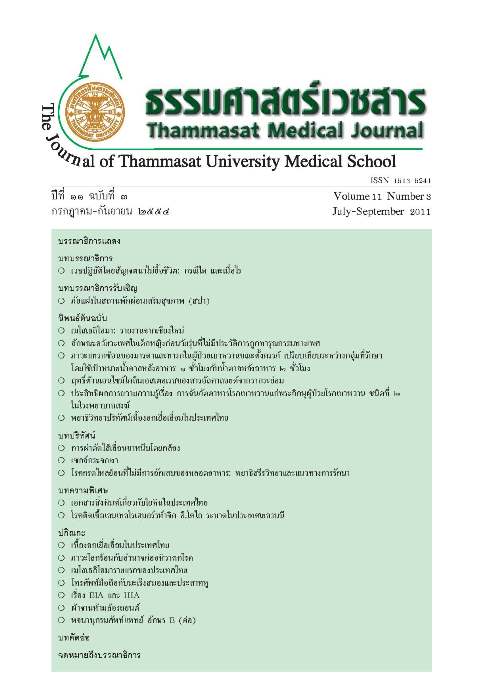The Effects of an Intrinsic Motivation Program on Motivation & Acceptance to Rehabilitation Treatment among Drug Dependent Clients at one Treatment Center for Drug Dependence in Pathumthani Province
Keywords:
แรงจูงใจภายใน, การเข้ารับการฟื้นฟูสมรรถภาพ, ผู้ติดสารเสพติด, Intrinsic motivation, Acceptance to rehabilitation treatment, Drug dependent clientsAbstract
The problem of drug dependent clients do not going to rehabilitation, leads to their higher relapse rates. Thus, fostering motivation for rehabilitation is important. The purpose of this quasi-experimental study was to determine the effects of an intrinsic motivation program on motivation & acceptance to rehabilitation treatment among drug dependent clients at one treatment center for drug dependence in Pathumthani province. Eighty participants were randomized equally into experimental and control groups (n = 40 for each group). The control group only received usual detoxifi cation care, whereas the experimental group received usual care plus the intrinsic motivation program. This program emphasized for drug dependent clients recognize the respond of 3 basic psychological needs, 1) need for competence 2) need for autonomy and 3) need for relatedness. There are including giving information, modeling, exercising, and positive feedback.
Data were collected using an intrinsic motivation questionnaire and counting who decide to continue with rehabilitation. Statistical analysis were performed using Chi-square test and independent t-test.
The results indicated that before the intervention, the two groups had equal level of mean motivation scores. After the experiment the mean difference in motivation scores between pre and post test was significantly higher among the experimental group than that of the control group (p < .05) and a higher proportion of the experimental group decided to continue with rehabilitation than that of the control group (p = .05)
In conclusion, this study revealed that the intrinsic motivation program was effective in increasing acceptance of rehabilitation treatment among the drug dependent clients. Further studies should be conducted could larger groups.
Key words: Intrinsic motivation, Acceptance to rehabilitation treatment, Drug dependent clients



